By Brown, J.M. and Carter, S. D. and Evans, N.J and Hartley, C. and Smith, R. F., Veterinary Microbiology, 2012
Research Paper Web Link / URL:
http://www.sciencedirect.com/science/article/pii/S0378113512003513
http://www.sciencedirect.com/science/article/pii/S0378113512003513
Description
Digital dermatitis (DD) is a major infectious lameness of dairy cattle and sheep considered to be caused by treponemes. The aim of this study was to identify antibiotics effective against DD treponemes that might be useful in the treatment of ruminant DD in the future or to identify antibiotics useful in isolation studies. Here, a microdilution method was used to identify in vitro antimicrobial susceptibility of treponemes cultured from DD lesions to eight relevant antibiotics. DD treponemes exhibited highest susceptibility to amoxicillin, azithromycin and gamithromycin. Unfortunately, amoxicillin whilst having potential for DD treatment in other animals (e.g. sheep) would require milk withhold periods in dairy cattle. DD treponemes were not particularly susceptible to two cephalosporins: cefalexin and ceftiofur, which do not require milk withhold. The bacteria demonstrated low susceptibility to trimethoprim and especially colistin suggesting these antimicrobials may be particularly useful in isolation of DD treponemes. The most promising high susceptibility results for macrolides indicate a rationale to consider veterinary licensed macrolides as DD treatments. Furthermore, given the DD treponeme antibiotic susceptibility similarities to established treatments for human treponematoses, identification of treponemacidal, long acting β-lactam analogues not requiring milk withhold may allow for development of a successful treatment for dairy cattle DD.
Digital dermatitis (DD) is a major infectious lameness of dairy cattle and sheep considered to be caused by treponemes. The aim of this study was to identify antibiotics effective against DD treponemes that might be useful in the treatment of ruminant DD in the future or to identify antibiotics useful in isolation studies. Here, a microdilution method was used to identify in vitro antimicrobial susceptibility of treponemes cultured from DD lesions to eight relevant antibiotics. DD treponemes exhibited highest susceptibility to amoxicillin, azithromycin and gamithromycin. Unfortunately, amoxicillin whilst having potential for DD treatment in other animals (e.g. sheep) would require milk withhold periods in dairy cattle. DD treponemes were not particularly susceptible to two cephalosporins: cefalexin and ceftiofur, which do not require milk withhold. The bacteria demonstrated low susceptibility to trimethoprim and especially colistin suggesting these antimicrobials may be particularly useful in isolation of DD treponemes. The most promising high susceptibility results for macrolides indicate a rationale to consider veterinary licensed macrolides as DD treatments. Furthermore, given the DD treponeme antibiotic susceptibility similarities to established treatments for human treponematoses, identification of treponemacidal, long acting β-lactam analogues not requiring milk withhold may allow for development of a successful treatment for dairy cattle DD.
We welcome and encourage discussion of our linked research papers. Registered users can post their comments here. New users' comments are moderated, so please allow a while for them to be published.
